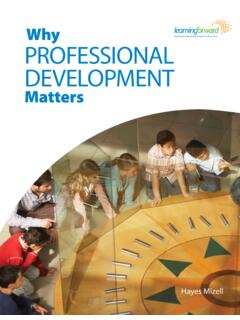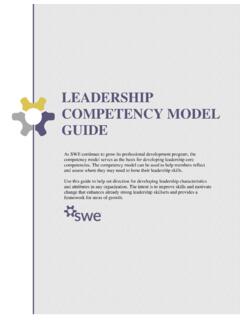Transcription of ICN Policy Brief - World Health Organization
1 ICN CIE CII 3, place Jean-Marteau, 1201 Ginebra- Suiza - Tfno.: +41 22 908 01 00 Fax: +41 22 908 01 01 c. elect.: - Web: ICN Policy Brief Advanced Practice Nursing: An Essential Component of Country Level Human Resources for Health Authors Denise Bryant-Lukosius, RN, CON(C), PhD and Ruth Martin-Misener, NP, PhD Purpose Globally, there is high demand and interest in advanced practice nursing (APN) roles as an essential vehicle for innovation and healthcare reform to provide more effective and sustainable models of This paper outlines important implications for integrating APN roles in country level human resources for Health (HRH) by summarising the evidence on: i) facilitators and evidence-based strategies for effective APN role implementation.
2 Ii) the contribution of APN roles for improving Health and Health system outcomes; and iii) the alignment of APN roles with the World Health Organization 's (WHO) Global strategy on Human Resources for Health2 and with the United Nation's3 Sustainable development Goals. This paper should be read in relation to the zero draft of the Health Workforce 2030: A Global strategy on Human Resources for Health .2 Background Defining the advanced practice nurse and types of APN roles. According to the International Council of Nurses (ICN), an advanced practice nurse is a "registered nurse who has acquired the expert knowledge base, complex decision-making skills and clinical competencies for expanded practice, the characteristics of which are shaped by the context and/or country in which s/he is credentialed to practice.
3 A master's degree is recommended for entry level."4 (2008, ). Clinical practice is a defining feature of APN roles. However, what makes the roles advanced and the means through which healthcare reform and innovation can be achieved, is the integration of clinical practice with responsibilities for education, organisational leadership , professional development , evidence-based practice and ,6,7 The two most common types of APN roles, the Clinical Nurse Specialist (CNS) and the Nurse Practitioner (NP)8,9 are the focus of this paper. How CNSs and NPs enact their roles is highly variable in response to population Health and practice setting needs. This fluidity makes CNSs and NPs assets for addressing dynamic healthcare system needs, but can also contribute to role confusion.
4 CNSs often have greater responsibilities for non-clinical activities such as education or quality improvement. NPs tend to have greater involvement in clinical care. NPs ICN CIE CII 3, place Jean-Marteau, 1201 Ginebra- Suiza - Tfno.: +41 22 908 01 00 Fax: +41 22 908 01 01 c. elect.: - Web: also have an expanded scope of clinical practice which gives them the authority to autonomously order diagnostic tests, make diagnoses, and prescribe treatments and medications. In contrast, CNSs have the same scope of practice as a registered nurse. These role differences have important implications for legislation, regulation and education.
5 Determining the types of APN roles that best fit country needs for improving Health and Health system outcomes is essential for effective role CNSs and NPs work in a broad range of practice settings including hospitals (acute and ambulatory care), primary healthcare (general and specialised), homes, community agencies and outreach programmes, and in long-term care. APN role deployment. Countries are in different stages of developing APN roles as part of their nursing workforce. Over 70 countries have or are interested in introducing APN More established APN roles are found in higher income countries but there is documented need for and the growing introduction of APN roles in low and middle income ,11,12 NPs have been introduced most often to increase access to essential primary healthcare in underserviced rural and remote communities and to address disparities in access to care for vulnerable populations with high needs as a result of their economic, social, cultural, educational or Health circumstances in urban settings.
6 CNSs have been introduced to provide highly complex and specialised care, develop nursing practice and support nurses at the point-of-care, and lead quality improvement and evidence-based practice initiatives in response to research advances in treatment and technology. A more recent driver for the introduction of APN roles has been healthcare reform and the need to improve the quality of healthcare and provide more sustainable models of healthcare delivery. Aging populations and increasing demands for care of the elderly, chronic disease management, Health promotion and chronic disease prevention and healthcare provider shortages are associated with needs for different healthcare delivery solutions that are amenable to APN roles.
7 The introduction of APN roles is also identified as an important HRH strategy to improve nursing recruitment and retention and to provide opportunities for career advancement. APN role integration into healthcare systems. There is limited access to current international data examining APN role integration within Health systems. Existing data indicates that APN role integration, even for countries where the roles have been established for well over 60 years, is quite limited. The ideal ratio of advanced practice nurses to the number of registered nurses in a country is not known, but provides a crude measure of role integration or the extent to which APN roles make up the nursing workforce and contribute to healthcare delivery.
8 The United States may have the greatest extent of Health systems integration with NPs making up and CNSs of the nursing workforce, followed by Ireland where NPs account for 2% of all registered In most other OECD countries with established APN roles, CNSs and NPs each make up less than 1% of the nursing workforce. Thus, tremendous potential remains for APN roles globally to improve Health and Health systems outcomes. The integration of APN roles into healthcare organisations and systems is challenging, contextual and evolves iteratively over time. In most countries, APN roles are introduced in an ad-hoc manner. As a result, formal policies and practices necessary to support optimal APN role implementation such as legislation, regulation, competencies and education, lag substantially behind the informal introduction of the roles.
9 Many of the challenges encountered occur because APN role implementation stimulates changes and makes evident the need for further change at macro, meso and micro levels. Ireland is one country that successfully utilised a ICN CIE CII 3, place Jean-Marteau, 1201 Ginebra- Suiza - Tfno.: +41 22 908 01 00 Fax: +41 22 908 01 01 c. elect.: - Web: systematic approach to APN role However, such an approach may be more challenging to employ in larger countries and those with less centralised models of nursing regulation and healthcare system governance. At the country and organisation level, the successful introduction of an APN role is facilitated by a goal and outcome orientated approach beginning with an assessment of patient and community needs and early engagement of key stakeholders such as physicians and other healthcare providers, administrators and patients.
10 It is important to discuss and agree on the gaps in the current model of healthcare, define the changes needed and identify the APN role required to achieve identified goals, and how this role will interface and collaborate with other members of the healthcare team. Alignment of APN roles with healthcare quality improvement goals is critical for success. Country level enablers of role development include high quality education programmes with standardised requirements and legislation and regulation that support scope of practice expectations for the role. Once developed, APN role implementation is facilitated by factors such as recruitment and retention strategies, public awareness of the APN role and national and healthcare setting leadership support.
















